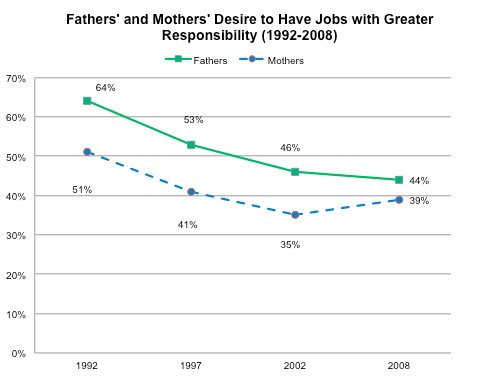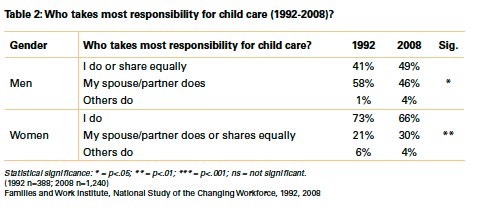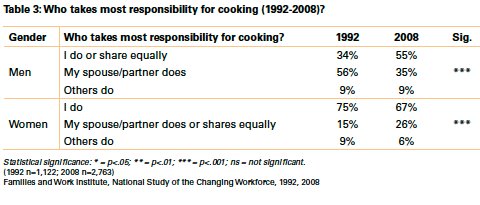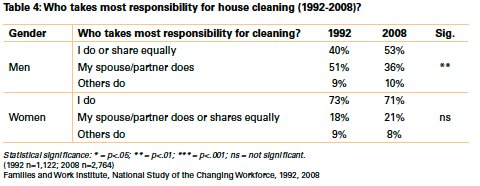
CATHERINE RAMPELL
Dollars to doughnuts.
In an article on Monday, I wrote about the choices faced by middle-class working mothers, who typically don’t have the resources to hire nannies and other support to help them “lean in” at the office. But one of the striking things I came across in my reporting was that a majority of working parents, men as well as women, don’t actually want more responsibilities at the office.
About every five years the Families and Work Institute conducts its National Study of the Changing Workforce, which surveys employed men and women about work and family roles. One of the questions is, “Thinking about your plans for the future, do you want to move to a job with less responsibility, stay at your current level of responsibility, or move to a job with more responsibility?”
Here are numbers that they pulled from their data set at my request:
 Source: Families and Work Institute, National Study of the Changing Workforce.
Source: Families and Work Institute, National Study of the Changing Workforce.
As you can see, in 2008, 39 percent of mothers of children under 18 said they wanted jobs with greater responsibility. The share was 44 percent for fathers. For whatever reason, the share has been falling steadily for fathers, down from 64 percent in 1992. For women the share dipped between 1992 and 2003 and then barely edged back up in 2008, but it is still well below its level in 1992. Maybe this reflects a generational value shift. Maybe advances in telecommunications (e-mail, smartphones) mean people are already working during non-traditional work hours more than they would like to.
But perhaps one of the reasons why men in particular are not itching for more responsibility at work is that gender roles have been changing, and men have been taking on more duties at home.
The National Study of the Changing Workforce, in fact, found that a higher share of fathers in 2008 said they took on at least equal responsibilities for child care than did so in 1992. (Taking responsibility for child care was defined as providing one-on-one care as well as managing child care arrangements.)
Women affirm that men are taking on more child care today than in the past, but there seems to be some quibbling between the genders about what exactly constitutes “equally” shared responsibilities. The survey found that there were many more fathers who said they were handling most of the child care or sharing the duties equally than there were mothers who said their spouses or partners were handling most or equal shares of child care.

There was a similar discrepancy between men’s and women’s responses about cooking. About 67 percent of women say they do “most” of the cooking, while 55 percent of men say they take at least an equal share.

The difference in opinion was even bigger when it comes to cleaning. A significantly larger share of men say take on at least an equal share of housecleaning duties in 2008 than in 1992, but women do not report any change over that period.

The Families and Work Institute report containing these survey findings concludes: “Whatever the precise objective degree of responsibility men are assuming for various aspects of family work, it has clearly become more socially acceptable for men to be and to say they are involved in child care, cooking and cleaning over the past three decades than it was in the past!”
Article source: http://economix.blogs.nytimes.com/2013/07/08/office-advancement-vs-home-duties/?partner=rss&emc=rss